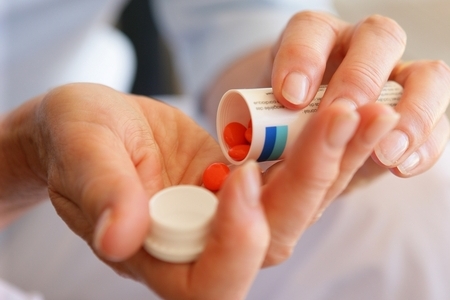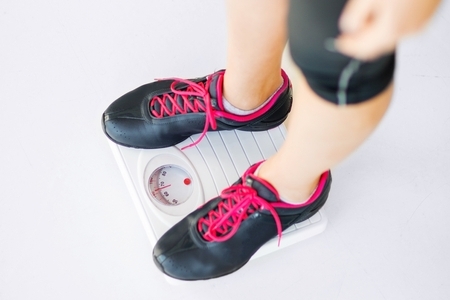 Alena Ozerova/PhotoSpin
Alena Ozerova/PhotoSpin
Many women are concerned about the changes they will experience as they go through menopause. A woman has gone through menopause when she has 12 consecutive months without a period.
Perimenopause is the transition time leading up to menopause. Many symptoms commonly associated with menopause such as hot flashes, night sweats and irregular periods begin during perimenopause.
Menopause is a natural part of aging that no woman can avoid. Knowing what to expect and preparing in advance can help you manage your menopause symptoms and keep your body healthy.
1)Check your baseline levels
Via Csaba Deli/PhotoSpin
Menopause is a time of transition. Your doctor will be able to help you make decisions that can ease you through the changes you are going to experience.
You can help provide the tools to make those decisions by requesting bloodwork to test your baseline blood levels including your hormone levels before they start to fluctuate. A baseline reading is a measurement taken when your levels are at their best.
Talk to your doctor about getting baseline readings on all your major hormone levels including estrogen, testosterone and thyroid as early in adulthood as possible.
Ask for a copy of the actual lab report and file it in your medical records. That way, even if you change doctors you’ll have the information your doctor needs to look back at your “healthy” levels.
2) Consider HRT

Via Auremar/PhotoSpin
There is no universal right answer when it comes to hormone replacement therapy. That means your best friend’s decision may not be the right choice for you.
HRT is the most effective way to ease some symptoms of menopause such as hot flashes and vaginal dryness. But there can also be serious health risks associated with using hormone replacements.
Before fluctuating hormone levels become an issue, talk to your doctor. Do your research to learn about available options for hormone replacement and to decide whether HRT is right for you.
3) Watch out for weight gain

Via Lev Dolgachov/PhotoSpin
Menopause doesn’t force you to gain weight. But many women find it harder to maintain their normal weight as they go through menopause. This may partly be due to hormone fluctuations. But other factors related to aging can also be to blame including natural loss of muscle mass and genetic factors.
Stress can also impact weight gain, whether from family changes as children leave home, job changes as you near retirement, or health issues for you or your spouse or other family members.
You can get a head start controlling weight gain by making sure you are at a healthy weight before you reach menopause. Develop a plan to increase exercise and make healthy changes to your diet to control calories and food portions if your weight starts to creep up.
4) Build up your bones
Via Auremar/PhotoSpin
Osteoporosis is a disease that results in weak or brittle bones. The hormone estrogen helps protect bone in women. But as estrogen levels drop during menopause, it can become harder for a woman’s body to make enough new bone to replace the bone that is naturally lost. As a result, 80 percent of people with osteoporosis are women.
You can help prevent osteoporosis by eating a diet rich in foods that are good for your bones such as fruits and vegetables, and by getting enough calcium and vitamin D in your diet.
Regular exercise including weight-bearing and muscle strengthening exercise can also improve your bone strength. Be sure to talk to your doctor first before starting a new exercise program.
You can also protect your bones by not smoking and by limiting alcohol to no more than three drinks a day.
Your doctor can test the density of your bones as a baseline and to determine whether you need to take more aggressive action to limit bone loss as you get older.
5) Don’t smoke
Via Taras Yakovyn/PhotoSpin
Here’s another good reason not to smoke. Women who smoke are approximately twice as likely to have hot flashes, according to a study from the University of Pennsylvania Perelman School of Medicine. And women who have a specific genetic variation are as much as 21 percent more likely to have hot flashes.
Other research studies also link smoking to earlier menopause and more severe menopause symptoms. So if you are a smoker, take the steps you need to stop smoking before you start menopause to reduce your symptoms.
6) Step away from stress
Via PS Productions/PhotoSpin
Stress can make menopause symptoms worse, and menopause can make stress worse or harder to handle. So before your stress starts to spiral out of control, start paying attention to your physical and emotional well-being as well as the status of the relationships in your life.
Be aware of what is normal for you, both for your stress level and your reaction to stress.
Develop positive ways to ease your own stress such as pampering yourself with a pedicure, getting enough sleep and avoiding caffeine and alcohol. And make sure you have a solid support system of family, friends and health care providers to help you keep stress from taking control of your life.
Sources:
Cleveland Clinic. What is Perimenopause, Menopause, & Postmenopause? Web. September 9, 2014. http://my.clevelandclinic.org/disorders/menopause/hic-what-is-perimenopause-menopause-postmenopause.aspx
Web MD. Menopause: Smokers Have More Hot Flashes. Salynn Boyles. Web. September 9, 2014. http://www.webmd.com/women/news/20120503/menopause-smokers-have-more-hot-flashes
Mayo Clinic. Women’s health. Web. September 9, 2014.
http://www.mayoclinic.org/healthy-living/womens-health/in-depth/menopause-weight-gain/art-20046058?pg=2
WebMD. It’s Not Your Mother’s Menopause. Mary Jo DiLonardo and Hilary Parker. Web. September 9, 2014. http://www.webmd.com/menopause/features/not-your-mothers-menopause
National Osteoporosis Foundation. Learn about Osteoporosis: Prevention and Healthy Living. Web. September 9, 2014. http://nof.org/learn/prevention
National Osteoporosis Foundation. What Women Need to Know. Web. September 9, 2014.
http://nof.org/articles/235
The North American Menopause Society. Stress: Getting Serious About Solutions. Web. September 9, 2014. http://www.menopause.org/for-women/menopauseflashes/stress-getting-serious-about-solutions
Huffington Post. 3 Tips To Fight Menopause-Induced Stress. Ellen Dolgen. Web. September 9, 2014. http://www.huffingtonpost.com/ellen-sarver-dolgen/menopause-stress_b_2968220.html
Reviewed September 10, 2014
by Michele Blacksberg RN
Edited by Jody Smith





Add a Comment1 Comments
I am so glad I got a chance to read this article. It has helped me a lot. I think although I'm in my late 40's I'm almost there. Hoping I don't get hot flashes. My grandmom didn't get hot flashes she always got Charlie horse. I can remember the nights she would pace back and fourth down the hallway. I used to massage her leg til the cramp was gone. I hope I have it easy!
September 10, 2014 - 9:02pmThis Comment